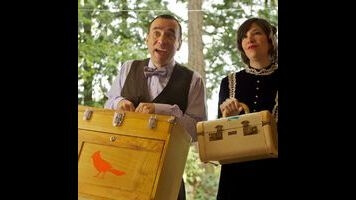Portlandia is more confident and unpredictable than ever

In 2011, Portlandia debuted with a song—“Dream Of The ’90s”—that celebrated and mocked Portland’s supposed air of aimless, bohemian self-involvement. “Dream” was more than a caricature of an eccentric city: With its clown-school graduates, goth babes, and fixie-riding weirdos, the song established Portlandia as a place for subcultures without a cause. Unlike, say, the hippie counterculture of the ’60s or the cool anarchism of late-’70s and ’80s punk rock, the dreamers of the ’90s didn’t require their righteous passion to come with any deep social purpose attached. Instead, they’ve perpetuated a world where good intentions carry the day—like in another quintessential Portlandia sketch, “Put A Bird On It,” which features two twee crafters swooning over their vapid artistry.
When you make four seasons of a show about people who disappear up their own assholes, you run the risk of disappearing yourself. Indeed, if Portlandia had failed to evolve its comic rhythm since season one, it would have become a cliché just like the earnest urbanites it lampoons. But what distinguishes Fred Armisen and Carrie Brownstein from their characters is the duo’s restlessness. Portlandia has a vast array of tics and idiosyncrasies, but it has few routines. There is no set template for an episode or for a season, and the creators are intent on keeping it that way.
Armisen and Brownstein’s ambition is on display in a fourth season that enriches the show’s world by allowing the supporting characters to carry more of the show than before. After a premiere season that mostly organized each episode around loose motifs, the second and third years of Portlandia built plot threads whose tendrils would extend through multiple episodes, culminating in the mayoral scandal that played out over the last half of season three. These threads were almost always centered on the “Fred” and “Carrie” characters—the creators as eager and naïve version of themselves, providing contrast with voices of semi-reason.
Fred and Carrie play a reduced part in the fourth-season episodes given to critics. They’re still here, but they don’t occupy quite the same place of privilege as before. In the new season, Portlandia has decided that it doesn’t always need Fred and Carrie to ground the action. The show would rather follow the orbits of the outlying planets in the Portlandia cosmos, with all their hilarious eccentricities. Steve Buscemi carries one episode, for instance, playing a schlub who represents poor, unloved celery in the cutthroat arena of vegetable media relations. There’s no voice of reason here—Buscemi buys in completely, and he’s just as self-assured in his insanity as the rest of the contrived industry he inhabits.
This season’s fourth episode, “Pull-Out King,” might be the clearest example of Portlandia’s deepening confidence in its secondary characters. The central thread of this episode follows Nina and Lance, Armisen and Brownstein’s gender-swapped couple, as an unexpected pregnancy threatens Lance’s reputation for pulling out before he spills his seed. After Jeff Goldblum shows up to take the term “pull-out king” through every possible permutation of meaning, the plotline ends with Lance reaching a rather un-Portlandian conclusion: He decides that the emotional bonds of his relationship are more important than the vaunted status that he invented for himself. Typically, Fred and Carrie were the only characters who grow and learn. Now, the caricatures are discovering their own depth.
Portlandia is varying its rhythm better than ever, like an experienced major leaguer who’s learned to vary his pitches. Early in its run, the show’s sketches too often followed a simple, time-tested pattern: Establish a premise and escalate, escalate, escalate. Sketches like “Family Plan”—a send-up of the cellular industry’s maddening bureaucracy—were fun on their own, but they also induced fatigue when seen alongside so many other segments that followed the same basic arc.
With time, however, the show has found a broader repertoire of sketch structures. One sketch in the new season begins with an Armisen character in a car, telling his passenger that he’s some sort of genius at finding parking spaces downtown. It seems obvious that this piece will descend into traffic hell much like the stop-sign stalemate of “No You Go.” And maybe that’s what the writers want you to think, as the sketch takes a sudden turn that still flows organically from the setup. Portlandia isn’t showy about its misdirection. Unlike the practitioners of outsized randomness like Tim & Eric, Armisen and Brownstein don’t need you to be aware that they just threw you a curveball. Instead, they stand up there and calmly keep pitching, mixing up their looks enough that it becomes pointless to predict what they’re going to throw next.
Portlandia still mocks the empty passions that dominate its world, but with time, its admiration for all its little standard-bearers has grown—an admiration for their heartfelt desire to live the right way. It’s not that Portlandia has lost its sharp comic edge; rather, it has added a complementary sweetness that is somehow just as funny. Portlandians spurn apathy and find pockets of meaning amid the noise, and as a reward, the show allows them to grow in small, humane ways. That growth gives the characters a modicum of direction to go with their passion. That’s the message of fourth-season Portlandia: The most meaningful ideas are not necessarily the loudest ones, but even loudmouths can find meaning.